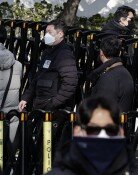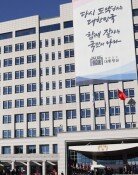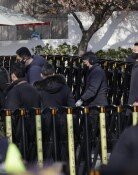[Editorial] U.S. Must Consider Dokdo Korean Territory
[Editorial] U.S. Must Consider Dokdo Korean Territory
Posted July. 29, 2008 03:18,
We express deep regret and concern over the decision by the U.S. Board on Geographic Names to classify Dokdo as undesignated sovereignty under the name Liancourt Rocks. The measure is not just an obvious distortion of history and reality, but also a grave violation of our sovereignty since labels defining Dokdo as Korean territory were randomly removed. The U.S. might say the name change is a way to remain neutral between its two allies, Korea and Japan, but the result clearly shows a denial of historical facts. It also raises suspicion that the U.S. has shown its ignorance on Dokdo and vividly displayed its siding with Japan.
The name Liancourt Rocks is derived from Le Liancourt, the name of the French whaling ship whose crew members were the first Europeans to see the islets in 1849. Dokdo, however, was Korean territory long before that year. Even after its discovery by the French, the islets were our territory. The U.S. geography agency should study Korean history before making a decision about the territorial sovereignty of the islets.
Since King Jijeung of Shilla incorporated the rocky islets into Shilla territory in 512, Dokdo has been part of Korea for 1,500 years throughout the eras of the Goryeo and Joseon dynasties and modern Korean history. The U.S. geography board should send its officials to Korea to investigate why the islets belong to Korea and what efforts Koreans have exerted to protect them.
We cannot but ask the reason behind the U.S. shift on Dokdo`s status. The geography agency since 1977 had called the islets Liancourt Rocks and considered them Korean territory. Did Japan exert pressure on the United States after publishing a handbook for middle school education that claimed the islets as Japanese territory? The geographical agency also changed the order of other names for the Liancourt Rocks and placed the term Dokdo behind Japans name Takeshima. When the dispute over the islets erupted again between Korea and Japan, the U.S. State Department suggested its unwillingness to intervene, saying the two allies must resolve the matter. But its dubious attitude seemingly tells us a different story.
Washington must consider the gravity of this issue, as its move is nothing short of backing the Japanese invasion of the Korean Peninsula. This is because Japan unilaterally integrated Dokdo as part of Shimane Prefecture in 1905 during Japanese colonial rule of the Korean Peninsula. Seoul-Washington relations will be negatively affected unless Washington shows sincere efforts to correct the wrong. It must immediately restore the description from the Liancourt Rocks to Dokdo. If the U.S. fails to meet this demand, President Lee should settle this in his planned summit with U.S. President George W. Bush in Seoul next week.







